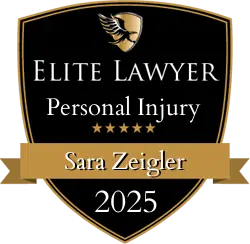The aftermath of truck accidents can be far more complex than that of two passenger vehicles crashing into each other.
There are many reasons for this, but the fact that the Federal Motor Carrier Safety Administration’s (FMCSA) rules play a significant role is one of them. The FMCSA outlines many rules that truck drivers and trucking companies must follow.
These rules are meant to keep everyone safe on the road. When they are violated, not only are people likely to be seriously injured, but the violations can also help prove that a truck driver or trucking company was negligent and caused the crash. Below, our West Virginia truck accident attorney explains in further detail.
What is FMCSR?
The FMCSR means the safety regulations outlined by the Federal Motor Carrier Safety Administration (FMCSA). The agency was established through the Motor Carrier Safety Improvement Act of 1999. The FMSCA is part of the U.S. Department of Transportation, and it is focused on reducing the number of accidents, injuries, and fatalities involving large trucks and other commercial vehicles. The agency develops and enforces safety regulations for commercial vehicles and their drivers. The agency also targets high-risk carriers and drivers to improve overall safety.
What are Federal Motor Carrier Safety Regulations?
The FMCSA outlines many safety regulations that truck drivers and truck companies must follow.
The regulations that commonly impact truck accident claims include:
- Hours of service: The hours of service rule is an important part of the safety regulations. This rule outlines the maximum number of hours a commercial driver may remain on the road and operate a vehicle. The hours of service rule also mandates specific rest periods to prevent drivers from becoming fatigued, which could cause a serious accident. For drivers transporting goods, the standard limit is 11 hours of driving after ten consecutive off-duty hours. Commercial drivers carrying goods can remain on the road for 14 consecutive hours while they are on duty.
- Maintenance and inspection of vehicles: The safety regulations regarding the maintenance and inspection of vehicles stipulate the requirements for commercial vehicles, including components such as tires, brakes, lights, and other important vehicle parts. The regulations also mandate regular inspection, maintenance, and repair of trucks to ensure they meet safety standards, so mechanical failures that could cause a crash are prevented.
- Transporting hazardous materials: Safety regulations for transporting hazardous materials provide thorough guidelines for truck drivers and trucking companies involved in transporting hazardous materials. These guidelines include rules for labeling, packaging, and placarding. These regulations also include requirements for emergency response planning to reduce the risks associated with transporting dangerous goods.
- Alcohol and drug testing: The safety regulations also outline requirements for alcohol and drug testing. The regulations outline comprehensive testing programs that include testing pre-employment, random testing during employment, post-crash testing, and testing based on a reasonable suspicion. The regulations also outline procedures for laboratory testing, specimen collection, and consequences for drivers who test positive for specific substances.
- Electronic logging devices (ELDs): ELDs are intended to accurately record a driver’s hours of service. Traditionally, truck drivers used paper logbooks and would write down their hours, which were not always accurate or honest. ELDs provide a more effective method of tracking the hours a trucker spends on the road.
- Commercial driver’s license (CDL) standards: The CDL standards outlined in the safety regulations establish testing requirements, including skills and written tests, and outline criteria for disqualification related to certain offenses, such as serious traffic violations and driving under the influence.
How Do FMCSR Violations Impact Truck Accident Claims?
The FMCSRs are in place to keep people safe. Truck drivers, trucking companies, and other affiliated parties that violate the regulations can be held liable for any accident caused by the violation.
Essentially, if you can prove a violation, you can claim compensation from the party who committed the violation. A violation of the law is, in some cases, enough to prove negligence.
Unfortunately, proving FMCSR violations is not easy. Collecting the necessary evidence is more challenging than it is in other personal injury claims, particularly when you are trying to recover from serious injuries caused by a truck accident.
Evidence Necessary to Prove FMCSR Violations
Just like when you are trying to prove other parts of your truck accident claim, you will have to present strong evidence to prove an FMCSR violation. This evidence may include:
- Data from the electronic logging device
- Driver logs and records
- Records of the truck’s inspection and maintenance
- Driver qualification files
- Results from alcohol and drug tests
- Police records and other accident reports
- Communication records
- Onboard camera footage
- Witness testimony
- Employer policies and procedures
- Expert testimony
While photos, videos, and other evidence from the accident scene make up the bulk of accident claims involving smaller vehicles, this is not true when a commercial truck is involved. Much of the evidence required to prove safety regulation violations includes hours of service logs, maintenance records, and black box data. The truck driver and trucking company are responsible for this evidence and have it in their possession. This makes it very difficult for accident victims to obtain it, and to determine that it has not suffered from evidence tampering, particularly when they are suffering from very serious injuries.
A West Virginia truck accident lawyer can help. While it is recommended that you obtain legal advice after any crash, this is especially true after a truck accident. A lawyer can subpoena the records and documentation you need to prove safety regulation violations and, therefore, prove that you are entitled to compensation.
Our Truck Accident Attorney in West Virginia Can Handle Your Case
The aftermath of any truck accident is extremely complex. There are many records and different types of compensation required to prove your case. At Kaufman & McPherson, our West Virginia truck accident attorney knows the important evidence that will prove your case. We can gather it and use it while we negotiate with the other side for the maximum settlement you are entitled to.
Contact us today to schedule a free case evaluation with our experienced attorney and to learn more about how we can help with your case.










